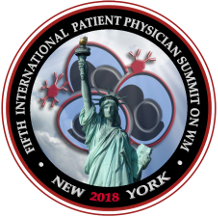International Patient-Physician Summit on Waldenstrom’s macroglobulinemia
Program Agenda
Co-Chairs:
Lia Palomba M.D., Memorial Sloan Kettering Cancer Center, New York NY, USA
Richard Furman, M.D., Weill Cornell Medical Center, New York NY, USA
Jorge J. Castillo, M.D., Dana Farber Cancer Institute, Boston MA, USA
Steven P. Treon MD, PhD, Dana Farber Cancer Institute, Boston MA, USA
Saturday, October 13, 2018
6:30-8:00am Registration and Continental Breakfast
8:00-8:30am Chairs Welcome and Program Overview of the 5th International
Patient and Physician Summit on WM
Videos of each of these presentations are available here.
Session I Genomics in the Diagnosis and Management of WM
Chairs: Roger Owen (UK) and Jorge Castillo (USA)
8:30-9:15am Overview of MYD88 and CXCR4 mutations in WM
How can MYD88 and CXCR4 mutations be sequenced?
How important is getting MYD88 mutation status for the diagnosis of WM?
What is the role of MYD88 and CXCR4 mutations in the management of WM?
How should CXCR4 mutations be used in making treatment decisions in WM patients?
9:15-9:30am Session Question and Answer Period
Session II Predisposition to WM
Chairs: Mary McMaster (USA) and Ola Landgren (USA)
9:30-10:15am Overview of known predispositions to WM
Which IgM MGUS and smoldering WM patients are at increased risk for progressing to active WM?
Does detection of mutated MYD88 in IGM MGUS patients help predict progression to WM?
What genomic changes accompany transition of IgM MGUS to WM?
How common is familial WM, and what genomics are responsible for familial disease?
Is Agent Orange exposure associated with WM?
10:15-10:30am Session Question and Answer Period
10:30am Morning Refreshments
Session III Disease Presentation in WM
Monique Minnema (Netherlands) and Giampaolo Merlini (Italy)
11:00-11:45am Overview of disease presentation in WM
What causes peripheral neuropathy in WM, and how should it be evaluated and treated?
What is Bing Neel Syndrome and how should it be evaluated?
What is Amyloidosis and when should you suspect it in WM patients?
When should plasmapheresis be used in WM patients?
11:45-12:00pm Session Question and Answer Period
12:00-1:00pm LUNCH
Session IV Genomic Landscape of WM
Zachary Hunter (USA) and Marzia Varretoni (Italy)
1:00-1:45pm Overview of key genomic findings in WM
How do MYD88 mutations impact WM cell growth and survival?
Are MYD88 mutations by themselves sufficient to cause WM?
How do CXCR4 mutations impact WM cell growth and survival?
How important are TP53 mutations in WM?
What are the treatment implications for mutations found in WM?
What genomic findings accompany disease transformation in WM?
1:45-2:00pm Session Question and Answer Period
2:00-2:30pm Afternoon Refreshments
Session V Clinical Trials Updates in WM: Rituximab-based therapy
Eva Kimby (Sweden) and Shirley D’Sa (UK)
2:30-3:30pm Overview of rituximab alone and in combination in WM
Update of rituximab clinical trials in WM:
Bendamustine and Rituximab as first line therapy in WM
Randomized clinical trial of BCR vs. FCR as frontline therapy in WM patients
Rituximab Maintenance or Observation in WM
Activity of Rituximab in patients with MAG positive peripheral neuropathy
3:30-4:00pm Session Question and Answer Period
4:00pm Day Adjournment
Sunday, October 14, 2018
7:30-8:30am Registration and Continental Breakfast
Session VI Clinical Trial Updates in WM: Proteasome- Inhibitors
Stathis Kastritis (Greece) and MJ Kersten (Netherlands)
8:30-9:15am Overview of Proteasome Inhibitor Activity in WM
Update of proteasome-inhibitor clinical trials in WM:
Long term follow-up of Bortezomib, Dexamethasone and Rituximab as frontline therapy in WM
Long term follow-up of Carfilzomib, Dexamethasone and Rituximab as frontline therapy in WM
Prospective Study of Ixazomib, Dexamethasone, Rituximab as frontline therapy in WM
Proteasome-inhibitors in previously treated WM
9:15-9:30am Session Question and Answer Period
9:30am Morning Refreshments
Session VII Clinical Trials Updates in WM: Ibrutinib
Steve Treon (USA) and Meletios Dimopoulos (Greece)
10:00-11:00am Overview of Ibrutinib Therapy in WM
Update of ibrutinib clinical trials in WM:
Ibrutinib monotherapy in treatment-naïve WM patients
Long term follow-up of ibrutinib monotherapy in previously-treated WM patients:
Update of pivotal trial
Ibrutinib monotherapy in rituximab-refractory WM patients
Randomized clinical trial of ibrutinib/rituximab versus rituximab in symptomatic WM patients
What are the mechanisms of resistance to ibrutinib in WM?
11:00-11:30am Session Question and Answer Period
11:30-12:30pm LUNCH
Session VIII Clinical Trials Updates in WM: Novel Agents in WM
Judith Trotman (Australia) and Jorge Castillo (USA)
12:30-1:30pm Overview of Novel Agents in Development for WM
Update of Novel Agent Clinical Trials in WM:
Phase II Study of the BTK-inhibitor Acalabrutinib in previously-treated WM patients
Phase II Study of the BTK-inhibitor Zanubrutinib in symptomatic WM patients
Phase II Study of the BCL2-inhibitor Venetoclax in previously treated WM patients
Phase I/II Study of the CXCR4-inhibitor Ulocuplomab plus ibrutinib in symptomatic WM
Phase II Study of the CD38-antibody Daratumumab in previously treated WM patients
1:30-2:00pm Session Question and Answer Period
Session IX Associated and Secondary Malignancy Risks in WM Patients
Alessandra Tedeschi (Italy) and Stathis Kastritis (Greece)
2:30-3:00pm Overview of other malignancies in WM
Are WM patients at higher risk for treatment unrelated cancers?
How important are treatment related secondary malignancies in WM?
What additional cancer screening should be adopted for WM patients?
3:00-3:15pm Session Question and Answer Period
3:15pm Afternoon Refreshments
Session X Case Presentations in WM
MJ Kersten (The Netherlands) and Steve Treon (USA), Moderators
3:30pm Case Presentations (4)
4:30pm Summit Adjournment

